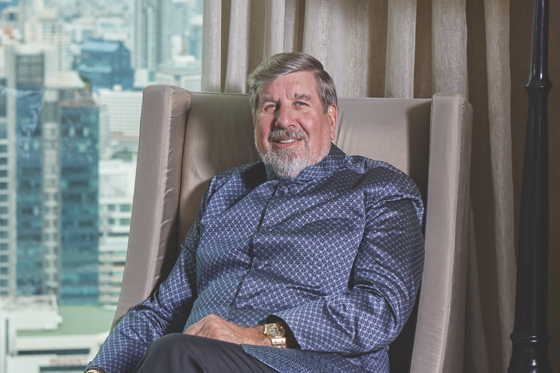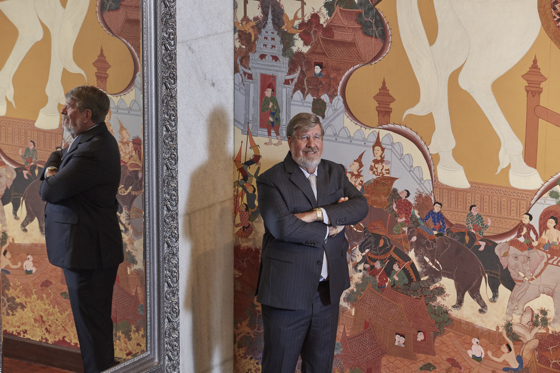William Heinecke doesn’t do much by accident. The visionary entrepreneur and self-made billionaire has shaped circumstances and taken opportunities where he found them, founding Bangkok-based Minor International and as CEO building it into one of the largest hospitality and leisure companies in the region.
Born in the United States, it was circumstances – his father’s U.S. foreign service job – that brought his family to Thailand, after stops in Japan, Malaysia and Hong Kong. Heinecke graduated from high school there, got married a year later and founded Minor in 1978 with a single resort in Pattaya. Two years after that he started a food company; eight years after that he took it all public.
“He sees things before anybody else sees them,” said Michael Sagild, former COO of Minor Hotels and now principal and managing director of Sagild & Associates in Bangkok. “He sees opportunity. He’s always a step ahead. It’s intuitive. It sits somewhere in his mind. He’s wired differently.”

The ideas don’t stop – Heinecke, 68, is credited with popularizing fast-food pizza among Thais who historically ate little dairy – despite challenges: political crises and coups, a devastating tsunami, tottering Asian economies. Minor Hotel Group’s 155 hotels in 24 countries, and the company’s commitment to Thailand and its impact beyond, is why readers voted Heinecke HOTELS’ 2017 Corporate Hotelier of the World.
William Heinecke is HOTELS 2017 Corporate Hotelier of the World: to read the feature on Ed Mady, our 2017 Independent Hotelier of the World, click here.
‘Thailand is home’
He’s not interested in being the biggest. “We’ve set out to deliver a great experience in everything that we do,” he said. “It’s just as important how we serve people a pizza as it is how we serve them a thousand-dollar room in the Middle East… If you don’t give great service and a great experience, they’re not coming back.”
Heinecke, who arrived in Thailand at 13 and never left, turned in his U.S. passport for Thai citizenship more than 25 years ago. It was prompted by a business opportunity in Vietnam, then off-limits to U.S. businesses. “Trying to explain to your shareholders that are Thai that we can’t do business as a Thai company in Vietnam because I happen to be an American seemed very difficult,” he said.
It was a personal decision as well. His two children and four grandchildren were born in Thailand and are Thai citizens. His son John is chief operating officer of Minor Food Group. “I’ll always be born and raised an American, but certainly Thailand is home,” he said.
Another circumstance that Heinecke said “quite by accident” kept him there: turning 18 during the Vietnam War. The likelihood of being drafted as a resident of Thailand was low but rose if he were to return to the U.S. His parents pushed college, and he was accepted at Georgetown University, but “my teachers didn’t think I would do very well,” he said.
He didn’t go. “Never served any time in the military, never served any time in the university.” He said he feels fortunate.
The hotels
“I often think of Mr. (Isadore) Sharp starting with motels,” Heinecke said, referring to the Four Seasons Hotels & Resorts founder. “We started with the equivalent of a motel and then from there we grew out to many beautiful hotels.” The properties, including several Four Seasons in Thailand, among other brands, residences and serviced suites, are owned or in JV or management contracts. More than 50 Oaks hotels, mostly in Australia, were acquired about six years ago; Europe and South America came on board with the acquisition completed last year of the troubled Tivoli brand and its 14 hotels in Portugal and Brazil. Minor’s Anantara luxury brand, founded in 2001, has 39 hotels and 15 in the pipeline, and its 4-star Avani, started in 2011, has 18 hotels and 13 in the pipeline.
The five-year plan aims for 252 hotels by 2021, expanding to places like Japan and the U.S. – the first Anantara, a managed property, is slated to open in Los Angeles in a couple of years, and he wants to continue growth in Africa. In many places, there is synergy: The company’s food arm operates more than 2,000 restaurants, and it’s not uncommon to find Pizza Company and Coffee Club locations alongside the hotels.
His main export with the hotels is Thailand’s strong hospitality culture. “That’s where we make a huge difference,” he said. “If you can begin to translate that kind of service to other parts of the world, you’ll certainly raise the standards there.”
Faster, better
“Bill will always say, ‘I’m happy to learn, and I’m open to learning and understanding new things,’” said Dillip Rajakarier, COO of Minor International and CEO of Minor Hotels since 2007. “As an entrepreneur he didn’t come from a professional hotel background or a professional food background, but I think it’s something he’s created with his willpower and passion with the people around him.” He will “throw a hundred things at you,” Rajakarier said, but then it’s up to the team to get results.
Heinecke said he’s a “demanding, probably,” boss, but he tries to surround himself with people who know more than he does. “We like to celebrate our successes, but we try not to celebrate for too long because there’s always someone around the corner trying to pass us,” he said. “I want to do it quicker or faster or better than the next person. So, I think that keeps you on edge a little bit, and I think it keeps you young, too.”

He continued, “Surrounding myself with fine hotels like Marriott or St. Regis or Four Seasons over the years has helped me to understand things better and recruit people that are, I think, much smarter than I am in the hotel business.”
It’s also helped in other ways. “We had the opportunity to see them at work and then see whether we could build a better hotel,” he said. “You also begin to see, what could you do better? Because what inhibits some hotels is that very often, they don’t own their hotels, so that inhibits what they can do. They’re focused on either their brand, or they’re focused on trying to make money for an owner or whatever… There were many things we could do if we owned the hotels, not only managed them, so we had the fortunate ability to be able to then go out and build our own hotel chain.” Anantara came out of those efforts.
Birth of a brand
“He is a very driven, very unusual individual. He’s someone that you constantly learn from,” said Chris Stafford, COO of 137 Pillars Hotels & Resorts in Bangkok and former head of the Anantara Resort Group, who worked with Heinecke in the early days of the brand. “You need stamina to work with him.”
The two worked together through two political crises in Thailand and the 2004 tsunami, which destroyed the Anantara Royal Coco Palm in Khao Lak shortly after it opened. Heinecke arrived within hours, helping retrieve and identify the bodies of guests and staff. Stafford recalled searching the wreckage of the resort with him.
“It was pretty awful,” he remembered. But Heinecke “didn’t shy away from anything – to me that is a true leadership skill.”
Among Minor’s sustainability initiatives is the Golden Triangle Asian Elephant Foundation, founded to rescue street-begging elephants in Bangkok; the elephants live in camps alongside their trainers, or mahouts, and families, at northern Thai hotels. A game of elephant polo started as a high-profile annual fundraiser in 2001 (Heinecke himself has played). Other programs include protecting wild elephants in Africa; a turtle sanctuary in Phuket; reintroducing coral in the Maldives; and education programs set up after the tsunami. “Some of the kids have just graduated,” Heinecke said.
“You leave an impression on people and you try and do something that will be positive for the world,” Heinecke said. “But I think you’ve got to be cognizant of your legacy and what you are leaving. And the world belongs to all of us, so we better take care of it.”
